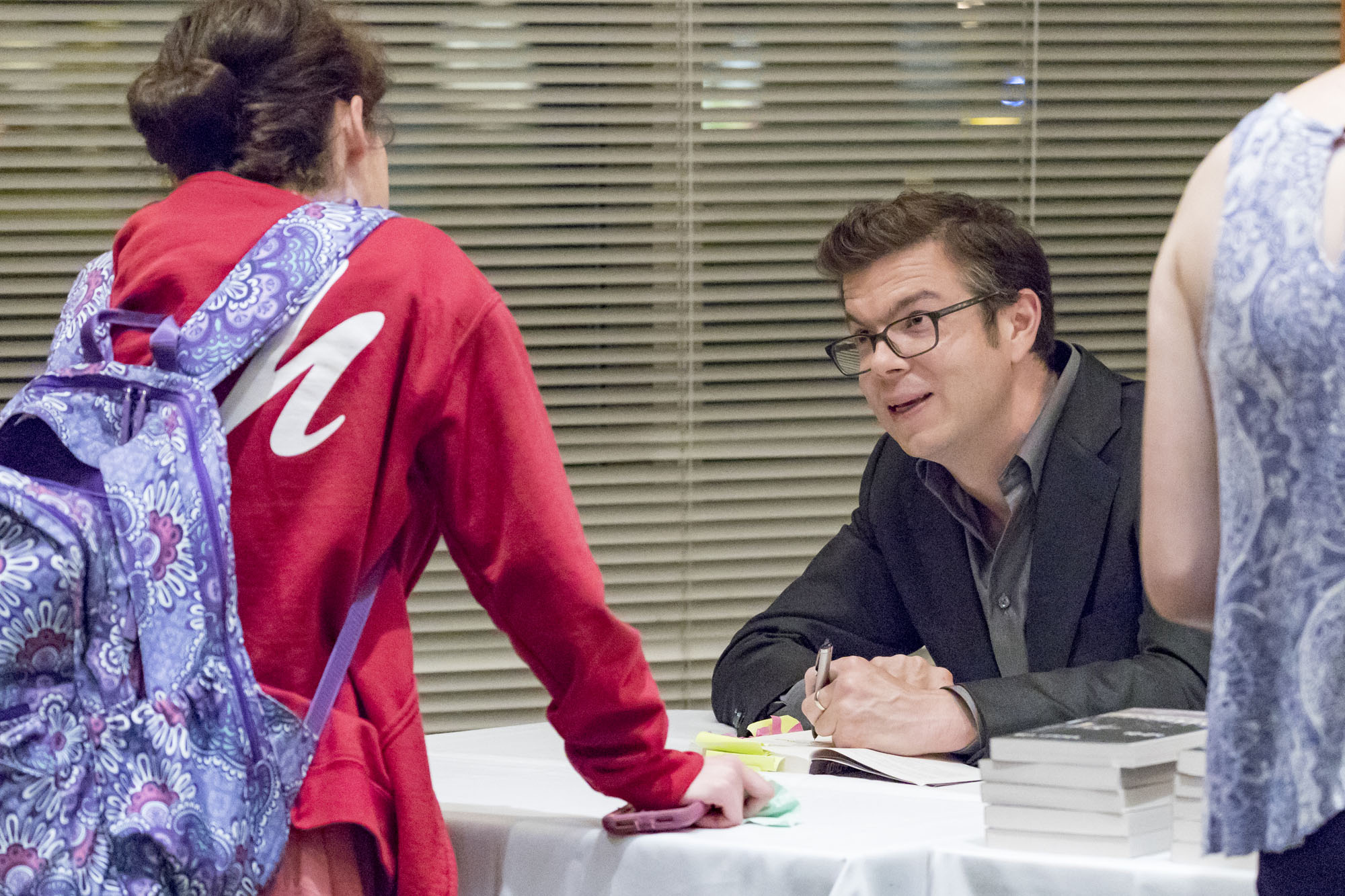The author is here. The author is a real person, a person who I almost slam into upon entering Miller Forum, where he’s standing in a group of English professors. Upon seeing the face I saw on photos in the back of two books, I brace myself and walk to my seat, eyes wide. All of us have read his work, and none of us quite know what to expect. Will the author of this room be “the author” of his novel, a narrator that leaves little room for his readers to breathe?
The author starts off his question & answer session with an apology. His book has been “inflicted upon” us Living Writers students, he says with a sheepish smile, and in just a few seconds, everything’s changed. This man is an author, yes, but he’s writing a different story, a self-aware, thought-provoking, deeply human tale of a guy who’s just trying to figure everything out. He now has his own name, one distinct from the shade of himself presented in his novel 10:04: Ben Lerner, Fulbright Scholar, MacArthur Fellow, National Book Award Finalist.
This closed question and answer session, as well as a public reading and subsequent Q&A, were both a part of Lerner’s visitation to Muhlenberg as a featured guest of the Living Writers program, which also featured poet Ada Limόn and playwright Marina Carr earlier this semester, on Oct. 10. Though many students were interested to hear from Lerner in person, some, like Blake Chernin ’19, were initially skeptical after reading 10:04, his second novel, published in 2014.
“I first consciously encountered Lerner in Living Writers (I came to realize that I had actually read a bit of his book The Hatred of Poetry in a class last fall, but Living Writers was the first time I engaged with him, Ben Lerner, as a writer),” said Chernin. “To be honest, my initial impressions of his work were not great. I think a lot of 10:04 is bogged down by a sort of white-guy philosophical mysticism which haunts our literary and academic worlds … I had an idea that Lerner was attempting to take down this sense or style, but to me that begs some questions: What does it mean that a white man has to propagate this style in order to unpack it, and does this reproduction undermine that project? Is he genuinely seeking to unpack the style, anyway, or was I just hopefully projecting?”
I’ll admit I shared this skepticism: 10:04 is a novel that lives in between fiction and non-fiction, a novel in which the first-person narrator is named “Ben” and shares many factual traits with its creator, but is also distinctly not-Ben-Lerner in other, more personal facets of the character/narrator’s life. The narrator is claustrophobic: paragraphs digress into anxious extrapolations of possible future events, the embodied apocalypse of a heart condition blends with the worldwide apocalypse of climate change, time collapses and stretches and children created with a friend/almost-lover are thought and medically manipulated into maybe-existence.
It is impossible to tell in an isolated reading whether the novel is a memoir or a fantasy or an altogether new creation, and, as it turns out, this unsettling uncertainty is all part of Lerner’s own philosophy: during the Living Writers Q&A, he professed a love for manipulating genre in order to play with reader expectations. If you can convince yourself to perceive something as a certain genre, Lerner posits, you can change how you understand it – being told that a series of noises is music, for example, will change how you comprehend and categorize them. Novels, Lerner believes, can absorb other media within their pages; they “create opportunities for readers to encounter other kinds of art” all in one place.

Indeed, 10:04 certainly makes the most of this liminality by including photographs, poetry (both original and quotes), fiction and nonfiction, all blending together to create a novel best understood in the presence of the man who wrote it. Lerner is both like his narrator and totally unlike him; he constantly refers to the “Ben Lerner” of the novel as some third-person “he,” a distant relative vaguely related to the man himself but incapable of being confused with him. Some students, including Taylor Garrison ’20, were comforted by this revelation.
“I found Lerner’s Q&A to be eye opening,” Garrison said. “He wasn’t like his narrator at all, save for the anxiety. I felt relieved. Lerner was so generous; he answered questions but clarified that it was only his perspective on the issue … Lerner is deeply interested in political philosophy and how our world is dominated by capitalism and commodities. My initial frustration with the cerebral nature of 10:04 shifted as I learned more about his way of thinking; 10:04 is really all about consciousness.”
This consciousness, this awareness and cognizance of how his narrator comes off and the way that works upon the reader, is what makes Lerner’s work so puzzling and ultimately spellbinding. Lerner understands that the societal workings the narrator so laments but does not work against in the novel – the workings that allow him to seal a lucrative book deal within its pages – are also working upon him in real time, and the human Lerner is unafraid to address these workings, is willing to unpack them and analyze how he and his work fit into the larger scheme of things. Lerner’s take on economies also struck student Frankie Parker ’20, who took note of his phrasing and applied it to her own lived experience.
“… [Lerner] described art as ‘a way of trying to imagine some value other than price.’ He definitely is very interested in how art becomes a commodity, and that’s something I’m interested in, too. Over the summer people kept asking me to draw their pets for them … and it was a great opportunity for me to ‘get my art out there,’ and make some money, but I didn’t feel passionate about it at all, having to repeat the same type of drawing over and over again,” said Parker. “I definitely appreciate 10:04 more now that I’ve listened to Lerner speak in person[and] I’m definitely interested in reading his poetry and the book he is working on now.”
Lerner’s reading from this new book, The Topeka School, was for me the highlight of his appearance last week. Written in third person (unlike Lerner’s previous novels, Leaving the Atocha Station and 10:04) and narrating the story of a teenage boy, again a version of Lerner, and his quest to find his girlfriend after she abandons him in the middle of lake, the excerpt that Lerner read was like a breath of fresh air. Able to separate ourselves from the events happening in the story by virtue of the third-person retelling, we in the audience were captured by Lerner’s every word. When his protagonist realizes the dizzying fact that he has unintentionally broken into an unfamiliar home, gasps rang throughout Miller Forum. When the narrator zooms out, imagining identical homes with identical people performing identical tasks all at once, we the listeners floated above our seats, looking down on a lakeside town in Kansas. When the protagonist’s girlfriend describes slinking down in her seat at a family dinner, snaking out from under the table without her stepfather noticing, my friend and I found ourselves repeating the move in our own chairs. Lerner had successfully taken over our combined consciousness, and we loved every second of it.
For some Living Writers students, Lerner’s visit to Muhlenberg was a kind of lesson in withholding judgement. As Chernin said:
“Yeah, I did something close to a 180 on the guy. Shows what I know. He was very intelligent and even warm, I thought, as a speaker. I don’t think I’ll ever love 10:04, but I do think I understand it better, and I feel more confident that my best suspicions about it were true. I am very genuinely looking forward to The Topeka School. It sounded really good. More embodied and less philosophical than 10:04 (no shade to philosophy, by the by, I just think that fiction is better able to live in the body than Lerner was letting it up till now). Again, shows what I know. I’m pretty glad to have been wrong.”
The next Living Writer, poet Danez Smith, comes to Muhlenberg on Oct. 24. Don’t miss their reading and Q&A – you never know how it might just change your world.
Brooke is a senior double majoring in English and Media & Communication. She's passionate about french toast, Kate Bishop, Steven Universe and the ocean coasts of Ireland. On campus, she is a Writing Tutor, Orientation Leader and member of the Girls Next Door, Muhlenberg's all-lady a capella group. She could not be more excited to serve as your Editor-In-Chief this year!






















